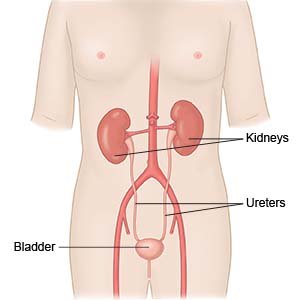Laparoscopic Cystectomy with Ileal Conduit
Medically reviewed by Drugs.com. Last updated on Aug 4, 2025.
Laparoscopic cystectomy with ileal conduit is surgery to remove your bladder. Your surgeon will use a scope inserted through small incisions on your abdomen to do the surgery. He or she will use a small section of your intestines to create a urostomy (ileal conduit). This will allow urine to drain from your kidneys through an opening on your abdomen and out of your body. The opening, called a stoma, will be connected to a bag that collects urine.
 |
DISCHARGE INSTRUCTIONS:
Call your local emergency number (911 in the US) for any of the following:
- You have any of the following signs of a stroke:
- Numbness or drooping on one side of your face
- Weakness in an arm or leg
- Confusion or difficulty speaking
- Dizziness, a severe headache, or vision loss
- You have chest pain.
- You feel lightheaded or short of breath.
- You cough up blood.
Seek care immediately if:
- Your arm or leg feels warm, tender, and painful. It may look swollen and red.
- Part of your bowel sticks out through your stoma.
- You have severe abdominal pain.
- Blood soaks through your bandage.
Call your doctor or surgeon if:
- You have a fever.
- Your incision wound or stoma is red, swollen, or draining pus.
- You have nausea or are vomiting.
- You do not get urine when you catheterize the stoma.
- You are constipated or cannot have a bowel movement.
- You have questions or concerns about your condition or care.
Related medications
Medicines:
- Medicines may be given to decrease pain or to prevent a bacterial infection. You may also get medicine to make it easier to have a bowel movement.
- Take your medicine as directed. Contact your healthcare provider if you think your medicine is not helping or if you have side effects. Tell your provider if you are allergic to any medicine. Keep a list of the medicines, vitamins, and herbs you take. Include the amounts, and when and why you take them. Bring the list or the pill bottles to follow-up visits. Carry your medicine list with you in case of an emergency.
Incision wound and stoma care:
Carefully wash your incision wound and stoma with soap and water. Dry the area and put on new, clean bandages as directed. Change your bandages when they get wet or dirty. Ask your healthcare provider or surgeon for more information on stoma care.
Self-care:
- Rest as needed. Slowly start to do more each day. Return to your daily activities as directed.
- Prevent constipation. Eat foods that are high in fiber, and drink more liquids. High-fiber foods include fruits, vegetables, whole grains, and bran. This will help soften your bowel movements. Regular exercise and extra liquids may also help prevent constipation.

- Ask which activities are safe for you. Do not lift heavy objects. Ask when you can return to work, drive, or have sex. You may have problems with sex after your surgery. Talk to your healthcare provider if you have any problems or concerns.
- Do not smoke. Nicotine and other chemicals in cigarettes and cigars can cause lung damage and increase healing time. Ask your healthcare provider for information if you currently smoke and need help to quit. E-cigarettes or smokeless tobacco still contain nicotine. Talk to your healthcare provider before you use these products.
Follow up with your doctor or surgeon as directed:
You will need to return to have the stents removed, and you may need more tests. You will also need to return to make sure the stoma is healing. Write down your questions so you remember to ask them during your visits.
© Copyright Merative 2025 Information is for End User's use only and may not be sold, redistributed or otherwise used for commercial purposes.
The above information is an educational aid only. It is not intended as medical advice for individual conditions or treatments. Talk to your doctor, nurse or pharmacist before following any medical regimen to see if it is safe and effective for you.
Learn more about Laparoscopic Cystectomy with Ileal Conduit
Care guides
Further information
Always consult your healthcare provider to ensure the information displayed on this page applies to your personal circumstances.
